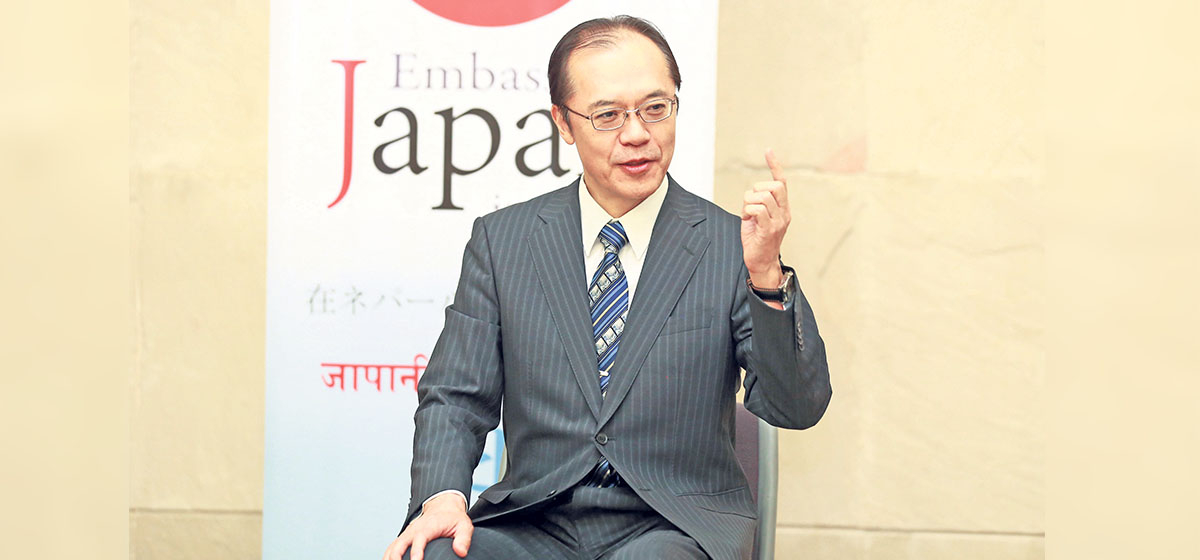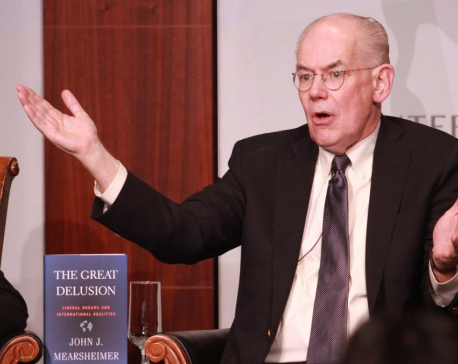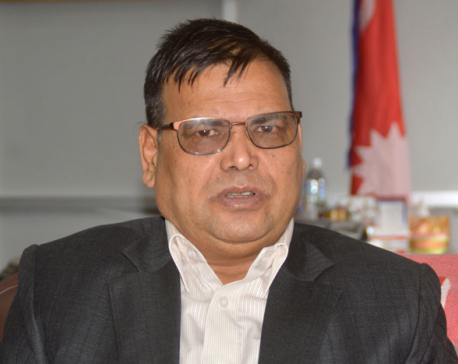
OR
I'll spare no effort to further strengthen bilateral relationship: Newly-appointed Japanese ambassador
Published On: April 4, 2021 05:00 PM NPT By: RSS

KATHMANDU, April 4: Kikuta Yutaka is the newly-appointed ambassador of Japan to Nepal. Diplomat Kikuta Yutaka who was serving at Japan’s Ministry of Foreign Affairs has been appointed as the ambassador for Nepal.
Prior to this, he was the ambassador for Nigeria. Before that, he served as the deputy chief of mission for Bhutan and India in 2015.
Experienced diplomat Kikuta Yutaka had worked as part of Japanese missions in several countries including Thailand and the Netherlands.
Excerpts of an interview with the new ambassador:
Nepal and Japan enjoy warm and friendly relations for a long time both at the government-to-government and people-to-people levels. How will you further strengthen Nepal-Japan relations in the days ahead in your term?
First of all, I am very pleased to be designated as Japan’s envoy to this fascinating country, Nepal, where Sagarmatha lies, and whose motto is जननीजन्मभूमिष्चस्वर्गादपिगरियसि “Mother and motherland are greater than heaven”. I am looking forward to working with the government and people to see “Prosperous Nepal, Happy Nepalis” (Sambriddha Nepal, Sukhi Nepali).
Nepal and Japan have been enjoying a long-term friendship, as I will describe later. I have unforgettable memories of my own, too. Based on such friendship, I will spare no effort to further strengthen our bilateral relationship.
My strategy is to meet as many Nepali people as possible, both high-ranking leaders and common people, and to visit as many places in Nepal as possible. I believe Japan has a variety of tools to further strengthen the existing cordial relationship. By hearing the people’s voices, and seeing the various charms and challenges of this country, I will explore how best Japan can cooperate with Nepal, using its policy mix to the largest extent possible.
There is a long and deep history between Japan and Nepal, all started with the visit of a Japanese monk, KAWAGUCHI Ekai, to Kathmandu in 1899. Japan and Nepal established official diplomatic relations in 1956, and we have been strengthening our relationship as true friends ever since.
High-level exchanges between the two countries have been quite active; the Rt. Hon. President Mrs. Bhandari visited Japan and the foreign ministers from both countries traveled to see each other recently.
Next year, 2022, is the 120th anniversary since the first eight Nepali students were dispatched to Japan for their studies.
Personally speaking, my hometown is Fukushima in Japan. Therefore, I was so grateful to the Nepali people for their prayers and help when the Great East Earthquake hit the Tohoku region in 2011. As you can imagine, it was still so cold in the mountainous northern part of Japan in March.
The people there, including my parents, relatives, and friends, had no food, no electricity, no heat, no gasoline, etc. At that moment, the 5,000 blankets Nepal kindly sent to the region in fact saved thousands of lives. Freshly cooked Dal-Bhat and warm Nepalese coffee also encouraged their hearts and bodies to survive.
That was why Japan provided support to Nepal soon after the 2015 Gorkha Earthquake, of which tremor I felt in New Delhi, sending emergency rescuers and relief materials and have been assisting the reconstruction of schools, residential homes, and supporting Nepal to be a more disaster-resilient nation.
In return, the Nepali people in Japan kindly visited Kumamoto in 2016, volunteering to cook Dal-Bhat for the Japanese who were affected by the Kumamoto Earthquake in April 2016. It was said that they would like to show their appreciation for the Japanese government’s assistance during and after the 2015 earthquake in Nepal.
In this way, the strong friendship between Nepal and Japan is based on mutual help and respect between the countries and heartfelt sympathy among the people even in the difficult times.
Japan remains one of the largest donor countries for Nepal for the upliftment of Nepal’s development efforts, including infrastructure, socio-economic, education, health, etc.
In the changed context of globalization, how Nepali entrepreneurs can attract Japanese investment, technology, and technical support? How can the embassy help Nepali entrepreneurs to achieve this goal?
When the President Bhandari visited Bangladesh recently, the President stated that in order to increase and strike a balance in trade, it is important to remove difficulties in trade, develop infrastructure, and ensure easy market access.
I totally agree with the President. I would say the same can be said to attract foreign direct investment, too. Rather than increasing the hurdles, how much the Nepali entrepreneurs and businesspeople could show their charms to attract Japanese investors under conducive government policy really matters.
One of the opportunities may be EXPO 2025 OSAKA, KANSAI, JAPAN, in which Nepal will participate. This special occasion will be a showcase for Nepal to present its prosperity and happiness to the world.
Japan has been supporting Nepal as a long-term friend by assisting in agriculture, healthcare, education, infrastructure, good governance, peace-building, and helping Nepal’s recovery from the earthquake by making Nepal a disaster-resilient nation, as well as helping in various other sectors for Nepal’s social and economic development.
Not only money, but Japan has also been extending a lot of technical assistance as well because we believe that nation-building starts with human resource development.
Your Excellency, the COVID-19 pandemic has created a huge loss of employment, economic opportunities, and access to basic services such as health, education. How is the Japanese government thinking about helping countries like Nepal? Are there any plans?
Yes, we have made some significant contributions so far and we have plans for the future. Since last year, Japan has been contributing to formulating the COVAX Facility and announced its financial contribution of 200 million US dollars in total.
I landed at Tribhuvan International Airport on the morning of March 7th, 2021, traveling from my former posting in Nigeria, as one of the passengers of a flight that happened to carry the COVAX vaccines to Nepal.
I had a chance to talk with Hridayesh Tripathi, Minister for Health and Population, and ambassadors of donor countries, and members of international organizations, who gathered there to welcome the vaccines (not me) on that day. It was just a coincidence, but it was my very first experience in Nepal.
The vaccine is important, but the cold chain is also vital. On March 9th, 2021, the Government of Japan decided to extend Emergency Grant Aid of approximately 41 million USD to 25 South East and South West Asian and Pacific Island countries, including Nepal.
This grant is to assist cold chain equipment, including medical equipment such as cold-storage facilities and transportation, to ensure the vaccines reach down to the last person as “Last One Mile Support” to ensure vaccinations for each country, through the United Nations Children’s Fund (UNICEF).
Besides these direct remedies, Japan has been supporting Nepal on the issues caused by COVID-19. For example, we assist food security in Nepal with WFP, USD 3.47 million has been provided to implement the mother and the child health and nutritional program in the vulnerable districts of provinces 1 and 2.
In the future Japan will continue to work together with the international community in this fight against COVID-19; based on its commitments made as a member of G7 and Quad (Japan, US, India, Australia) such as:
-We, the leaders of the Group of Seven, met today and resolved to work together to beat COVID-19 and build back better. (G7 February 19th).
-We will accelerate global vaccine development and deployment (G7).
-We resolve to agree on concrete action on these priorities at the G7 Summit in the United Kingdom in June (G7).
-We will join forces to expand safe, affordable, and effective vaccine production and equitable access, to speed up economic recovery and benefit global health (Quad March 12th).
-We will combine our nations’ medical, scientific, financing, manufacturing and delivery, and development capabilities and establish a vaccine expert working group to implement our path-breaking commitment to safe and effective vaccine distribution (Quad).
What could be the area of cooperation between Nepal and Japan in the future? How can both countries develop a long-term partnership?
One of the key areas of cooperation should be the reconstruction of society which will be more resilient to natural disasters, based on the concept of BBB “Build Back Better.” For example, stronger structures for houses and schools will be effective for the affected communities to enable them to restore their lives and move forward. As I mentioned before, we have a shared experience to this effect.
Moreover, Japan has been assisting Nepal’s economic growth through social and economic infrastructure, power and water, health systems, and education. For example, the Sindhuli Road (BP Highway) makes the daily lives of the Nepali people better through the smooth transportation of goods within the country.
For better access to medical care and education, we have been working with the Nepal government and local NGOs to achieve this.
With regard to the water issue, it is my great pleasure to see the Melamchi water finally reach Kathmandu on Sunday, March 28th. This achievement is the result of a construction project of Water Treatment Plant (WTP) at Sundarijal funded by Japan and related projects financed by ADB and others.
Japan’s support for the Plant was JPY5,494 million (equivalent to Rs 5,806 million), which purifies 85 million liters of water per day (MLD). I hope the clean water from the Melamchi River will help the daily life and improve the standard of living of Kathmanduites.
We understand that Nepal has been striving to consolidate democracy, and Japan has been working together with Nepal for good governance, and we would like to encourage Nepal’s aim to graduate from an LDC in 2022 and upgrade to a middle-income country by 2030, which will be achieved by the poverty reduction programs under the Nepal Government.
Environment protection and climate change are the most challenging issues which we should tackle together as the international community. Nepal is no exception when it comes, for example, to global warming as a country that has Himalayan glaciers.
Another example would be air quality within the city area. This may be eased by less traffic congestion in the Kathmandu Valley; which Japan has been working on as well. I must say solving such issues will lead to the better health of future generations.
People-to-people exchange is one of the important elements for both Japan and Nepal, to know each other further and to enhance our long-term partnership. We have a student scholarship program by the Ministry of Education, Culture, Sports, Science, and Technology (MEXT), under which a number of Nepali academics have studied in Japan, and a program called JDS (The Project for Human Resource Development Scholarship) by JICA for young Nepali civil servants to study in Japanese graduate schools.
We always appreciate the alumni’s contributions to the various sectors of the Nepali society, helped by their experiences in Japan, and their love for Japan as their second home. In addition to those student exchanges, there is a new opportunity opened in 2019, for Nepalis as “Specified Skilled Worker,” we welcome highly-skilled Nepali people to come over to Japan for work as well.
I am also looking forward to seeing the tourism sector between the two countries expand more, as tourism always gives us a new perspective of our world. It was a pity to hear that the Visit Nepal 2020 campaign was affected by COVID-19. However, the direct flight between Japan and Nepal by Nepal Airlines will be the key for travelers.
Last year we marked the Golden Jubilee of the first Japanese summit of Sagarmatha, achieved by UEMURA Naomi and MATSUURA Teruo and it was also the 45 years anniversary of TABEI Junko, a Fukushima native, becoming the first woman mountaineer to reach the summit of Sagarmatha.
Once the COVID-19 situation settles down, we would like to welcome more Nepalis to visit Japan for sightseeing and to enjoy Japanese culture as well as our traditional cuisine “Washoku,” and of course, many Japanese mountaineers and travel-lovers are waiting to visit Nepal soon.
How do the Japanese people treat and assess Nepal in your country Japan? Have you been in Nepal before? If so, what was the most memorable moment?
I think the Japanese people have a special sense of intimacy toward Nepal, stemming from the beauty of its nature, Buddhism and culture, food, and the people. The flower of Fukushima, my hometown, is Laliguras, the national flower of Nepal.
I remember the beautiful light-purple flowers on the jacaranda trees within the Valley when I visited Kathmandu as Director of the Southwest Asia Division of the Ministry of Foreign Affairs of Japan many years ago. On that occasion, I visited Budokan, a Japanese-style sports facility, which was built by Matsumoto City, Nagano Prefecture as a sister city of Kathmandu. Former Japanese Prime Minister, Ryutaro Hashimoto, who loved the mountains of this country, visited this Budokan for the opening ceremony in 2002. Both Hashimoto and I have 6th grade in black belt in Kendo, the Japanese swordsmanship martial art. I enjoyed practicing Kendo at the Budokan with young Nepali Kendo players.
In 2005, I welcomed the then Crown Prince Paras and Crown Princess Himani to EXPO 2005 AICHI JAPAN. The wooden wall decoration bestowed to me by Princess Himani has been my family treasure since then, and I found an ornament of the same motif in my office at the Japanese Embassy here this time!
You May Like This

Nepal should stay neutral; have good relations with both India and China for its security, stability: Prof. Mearsheimer
KATHMANDU, Aug 5: A prominent American scholar of international relations John J. Mearsheimer has suggested Nepal to stay neutral and... Read More...

Irish Speaker calls on President Bhandari
KATHMANDU, Sept 10: Speaker of the Irish Parliament, Sean O' Fearghail paid a courtesy call on President Bidya Devi Bhandari... Read More...

Economic diplomacy will be given priority: DPM Mahara
KATHMANDU, July 11: Deputy Prime Minister and Minister for Foreign Affairs Krishna Bahadur Mahara has said that the government would... Read More...




Just In
- Health ministry to conduct ‘search and vaccinate’ campaign on May 13
- Indian customs releases trucks carrying Nepali tea, halted across Kakarbhitta
- Silent period for by-election to begin from midnight
- SC issues short-term interim order to govt and TU not to take immediate action against TU legal advisor Khanal
- National consultation workshop advocates to scale up nutrition smart community in Nepal
- Patan High Court issues short-term interim order to halt selection process of NTB’s CEO
- NEPSE inches up 0.15 points; daily turnover increases to Rs 2.53 billion
- Bagmati Govt mandates tri-lingual signboards in offices














Leave A Comment